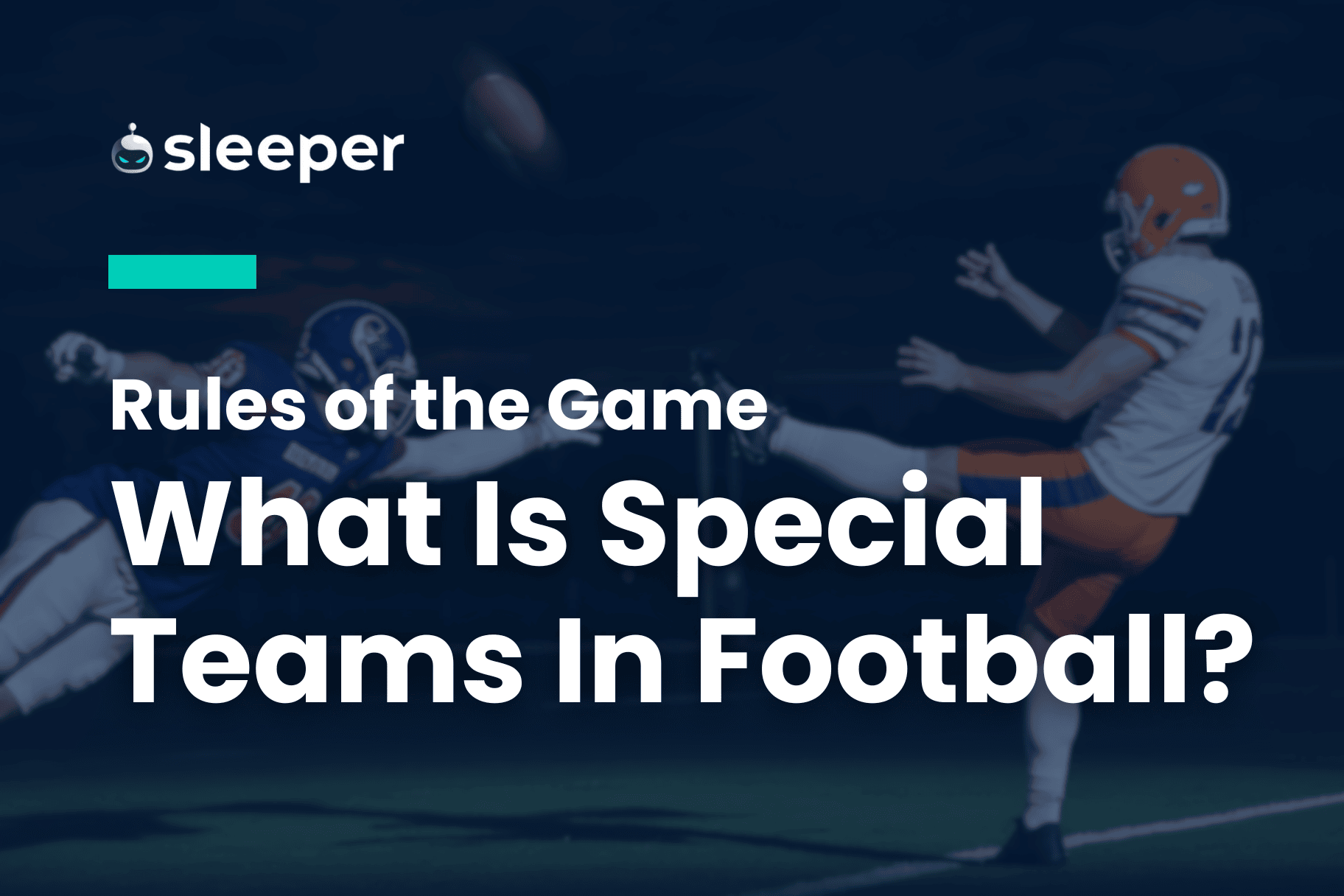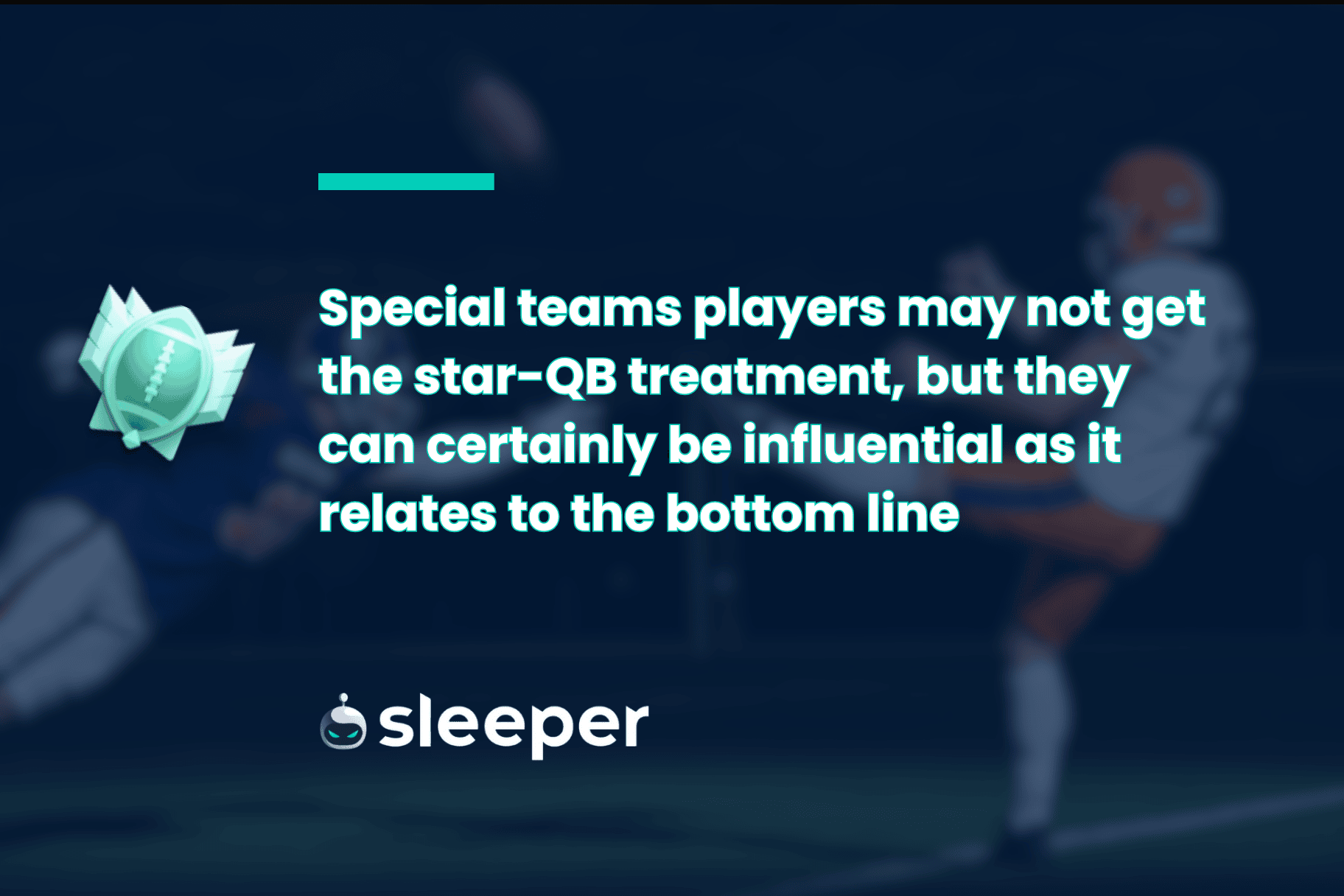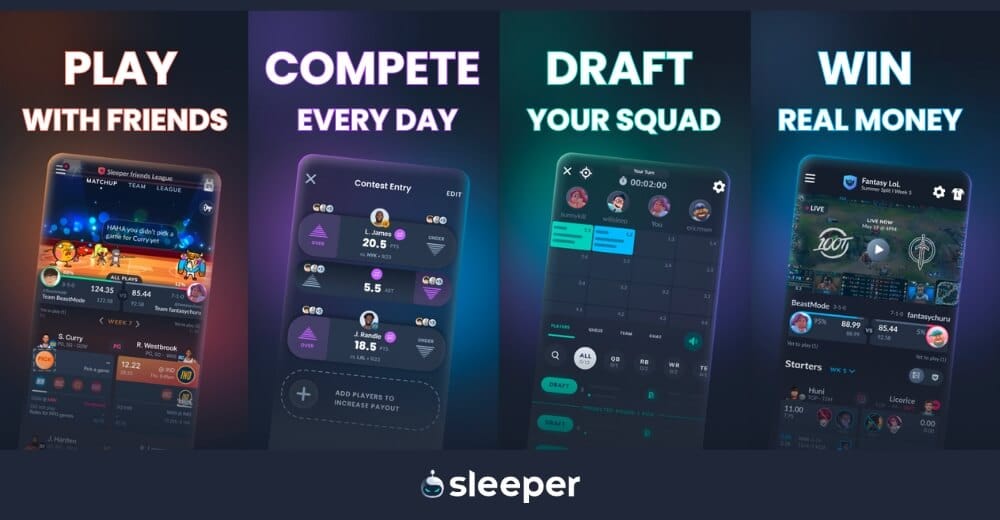Special teams may not be the most glamorous of groupings in an NFL game, but they provide significant momentum shifts and are a foundational part of any team’s success.

Football coaches like to talk about being competitive in all three phases of the game. Obviously, there’s the offense and defense. But the third one too often gets overlooked (except by successful fantasy football managers). Whether you're new to football and eager to learn more about the sport or a seasoned fantasy football manager aiming to sharpen your strategy, welcome to the wide-ranging world of special teams.
The Role of Special Teams in the NFL
In its simplest form, “special teams” refers to the group of players on each NFL club that handles the kicking plays.
Kickoff and punt teams (both on the kicking and receiving ends) and the units that operate on field goal and extra-point attempts are the players who are special teamers on a roster.
They often get second billing due to the nature of the beast, but a well-placed punt, excellent kick coverage, field goal block, or return for a touchdown — they’re all examples of big-moment plays that can turn the tide of any game in an instant.
Special teams players may not get the star-QB treatment, but they can certainly be influential as it relates to the bottom line, and anything that has a direct hand in wins and losses is worth exploring a bit more in depth.

Types of Special Teams Units
As mentioned, special teams generally revolves around the kicking game. Here are the core aspects:
Kickoffs
At the start of a game, the start of the second half, the start of NFL overtime and after every scoring play, there’s a kickoff.
The rules for the kickoff changed entering the 2024 NFL season, but the gist is the same: one team kicks off to the other, and the receiving team can either attempt to run it back or, if the ball sails to the end zone, catch it there and take a knee for what is called a touchback. Under the new rules, touchbacks on kickoffs put the ball at the 30-yard line, where the receiving team will begin its drive.
Kickoffs also include onside kicks, where the kicking team tries to gain back possession by grabbing the ball after it travels at least 10 yards. In 2024, the NFL changed the rules to require teams to declare when they attempt an onside kick.
Punts
Punts occur when it’s smarter for a team to kick the ball away to its opponent rather than attempt to secure a first down. Football teams have four downs with which to reach the yard line to gain. If they get to fourth down and they’re either in their own territory or realistically too far from the line to gain, they’ll punt.
The reason they kick it deeper down the field is because if they go for it on fourth down and do not advance the ball far enough for a first down, then the other team takes over at that spot and could have a very short field.
Teams can fake punt, which involves the ball being hiked either all the way back to the punter or another player in the formation and then that player either trying to run or throw for the first down. Fake punts are attempted in an effort to catch the opposition by surprise.
As with kickoffs, any punts that go into the end zone are ruled touchbacks, but the ball comes out to the 20-yard line. Punts can be returned by the receiving team, and the kicking team will have its players race down the field to cover the punt in an attempt to pin the opposition back. If punts go out of bounds, the ball is placed at the yard line where the kick was ruled to have crossed the boundary.
Field Goal Attempts
Teams generally attempt field goals when they get to the end of a set of downs and it’s unrealistic that they’ll either reach the line to gain or score a touchdown but are close enough where their kicker can boot the ball through the uprights.
On a field goal attempt, the long-snapper — the same player who hikes the ball back to a punter on a punt — sends the ball to a holder (often a punter or a backup QB), who is typically placed seven yards behind the line of scrimmage. Between those yards and the placement of the uprights, which is 10 yards deep into the back of the end zone, field goal lengths are determined by adding those 17 yards to the line of scrimmage. So a kick whose snap takes place at the 33-yard line is going to be a 50-yard field goal.
Like with punts, the defending team will attempt to block the field goal, and if they block it behind the line of scrimmage, scoop it and score it, it’s a touchdown.
The vast majority of field goal attempts occur on fourth down, but if it’s the end of a half, the last play of a game, or in an overtime period where a successful kick would win the game, the down is irrelevant.
Extra Point Attempts
After a team scores a touchdown, it has the option of kicking an extra point or going for a two-point conversion. On the latter, the offense stays on the field and attempts a play from two yards out. If it successfully gets into the end zone, then that touchdown will become worth eight points.
The standard approach is to attempt an extra point after a TD. The field goal unit will come on and try what amounts to a 33-yard kick for the chance to tack on one more point. Extra points are also referred to as PATs — point after touchdown.
Football Special Teams Positions
Kickers
Also known as placekickers, these players generally handle both field goals and extra point attempts while also taking on kickoffs. Some teams will have other players — the punter, for example — handle the kickoffs if they happen to have stronger legs.
Punters
Punters usually have one job, and that’s to pin the other team deep in its own territory. Any time a punt can either go out of bounds or be downed inside the opposing 10-yard line, that’s a job well done.
Long Snappers
Long snappers are specialists who hike the ball on field goal attempts, extra point attempts and punts. Their job is a simple but important one. Any snap gone bad can completely ruin a kicking play and put their team at a massive disadvantage.
Accuracy is also imperative for field goals and PATs, as those kicks generally happen at a rhythm between the snap, hold and kick, and if any part of that cadence is disrupted, the whole play becomes imperiled.
Return Specialists
Speedsters who are superb in the open field are usually tabbed to return kicks and punts. With the amount of touchbacks in today’s game, they don’t always get the opportunity to make an impact, but they can swing a game in an instant with a return that either sets up their team in excellent field position or is taken to the house for a touchdown.
Return specialists are usually wide receivers or running backs deeper on the depth chart, so they don’t typically contribute much during the course of a game. But if they can make some magic in the few moments that the ball is in their hands, they can become game-changers.
Gunners and Jammers
Gunners are players on the kicking end of a punt team who race down the field in an effort to either tackle the returners before they can get going or to down the ball deep in opposition territory.
Jammers are players on the receiving end who attempt to disrupt the gunners from generating any momentum or direct line to the returners so that the specialist can make a play and advance the ball forward.
Upback and Protectors
Upbacks and protectors are responsible for guarding against a punt block — while occasionally getting called upon to carry out a fake punt. But more traditionally, they’re on alert as the returning team attempts to rush the punter and disrupt the kick.
Special Teams in Fantasy Football
Special teams may not be the “sexiest” entity in football, but they play a regular role in the fantasy football landscape. Although some formats opt to do away with kickers and defense/special teams (D/ST) units, they’re still a regular staple in season-long leagues.
Kickers and D/ST are often taken in the final rounds of snake drafts or are frequently the object of $1 bids during auction/salary cap drafts, but they can play a significant role on a week-to-week basis.
There is an aura of unpredictability when it comes to kickers and D/ST, which makes them popular positions for managers to stream — i.e. add and drop new ones on a regular basis throughout the season — but if you’re able to find consistent answers at either or both positions, it’ll help complete your squad.
Kickers get points for field goals and the extra-point kicks after touchdowns, while D/ST usually collects points for defensive touchdowns, special teams touchdowns, sacks, interceptions, safeties, blocked kicks and fumble recoveries. A D/ST unit’s total tally also depends on how many points in a game it has conceded, with more fantasy points being awarded for the fewer real-life points given up.
For example, if the Packers defense gives up six points in a game, based on standard scoring across most platforms, that would net the Packers D/ST seven fantasy points. But if the Raiders defense gives up 20 points in a game, then the Raiders D/ST would net just one fantasy point.

Frequently Asked Questions
How do special teams impact fantasy football scores?
Between kickers and defense/special teams units, the oft-overlooked positions can wind up making or breaking a fantasy week. They’re not as consistent or reliable as the more traditional skill positions, which is why they’re usually left for the ends of drafts, but good ones can complete your squad.
When should I draft special teams in fantasy football?
Generally speaking, special teams picks should be among your last in fantasy football drafts.
Who usually plays on special teams?
In addition to the kicking and snapping specialists, special teams units are usually made up of backups who have made their team’s final roster as depth pieces — players who would only contribute on offense or defense in the event of injuries but whose chief attributes (speed, tackling, a nose for the ball, etc) make them uniquely qualified to handle kick coverage or returns.
Play Fantasy Football With Sleeper
Create a special team of your own by joining season-long fantasy football leagues on Sleeper. You can do so by either signing up on the website or downloading the app to start enjoying a user-friendly, ad-free platform with unique features and endless customization.
Sleeper also offers paid-entry daily fantasy sports contests, such as Sleeper Picks, where you’ll pick whether you think players will outperform or underperform their respective projections in an effort to win cash prizes.




